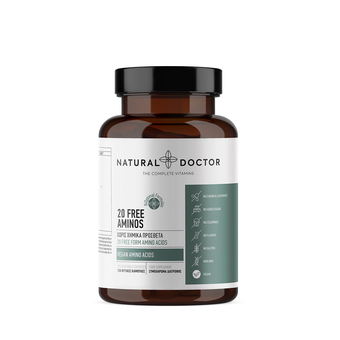The source of life

What are amino acids?
Amino acids are the source of life. They are the second largest component of the human body, with a percentage of 20%, while water covers approximately 60%.
Their action is very important for the proper functioning of the body since they serve as structural components for cells, hormones and enzymes.
About 500 types of amino acids have been discovered in nature, but the body needs around of them to develop and function properly.
Relationship of amino acids with proteins
Proteins are long or short chains of about 20 different amino acids. Amino acids serve as the basic building blocks of proteins in our bodies, and the complex combinations of these species produce up to a hundred thousand different proteins.
When we consume foods such as meat, fish and eggs the proteins contained in them are first broken down into the 20 types of amino acids and then reassembled into proteins in the body.
Free form amino acids: The energy source for athletes
Many times you may have wondered how athletes maintain their energy at high levels during intense or long hours of training.
Indeed, the demanding daily schedule of athletes creates a greater need to replenish energy in the body with amino acids.
As a source of energy, during exercise and for subsequent muscle recovery, athletes use free form amino acids.
Free form amino acids are absorbed faster than proteins, therefore supplementing with amino acids during physical activity is more beneficial.

The benefits of amino acids for athletes and marathon runners
Increased Endurance
A primary role in the performance of a marathon runner is endurance. Amino acid supplements help increase endurance by changing the way the body uses its main fuel sources, namely carbohydrates and fats.
For many athletes, glycogen depletion is a major problem, leading to exhaustion and a sharp decrease in performance. In a 2011 study that involved male volunteers and designed their training to completely prevent glycogen supply, one group was given free amino acids and the other a placebo.
Glycogen stores in the free amino acid group were so well protected that that group experienced a 17.2% increase in endurance.
Reduced fatigue
Free amino acids contribute to the normal functioning of the nervous system and help the body protect itself from the exhaustion and fatigue that sometimes accompanies intense training. Mainly, this is due to the relationship between low amino acids and tryptophan.
Normally, when amino acid levels are low, the body produces more tryptophan, which is then converted to serotonin in the brain which causes feelings of tiredness and mental fatigue. Free amino acid supplements can block this process.
Increased Mental Concentration
Amino acid supplements improve short-term memory, concentration, and cognitive ability. During matches – especially those lasting several hours – it can be the key to victory.
Muscle Protection
It's something you don't like to think about, but the harsh truth is that vigorous exercise can damage muscles. Often this "damage" is exactly what the body needs to rebuild and get stronger.
Endurance athletes and people who exercise regularly or people who fast are particularly at risk for muscle depletion. The ability to increase muscle protein synthesis and protect muscles means the body helps to recover from workouts faster, returning to the daily routine with less downtime
Less muscle pain
Reduced damage and improved recovery also reduce soreness that generally occurs after an intense workout. Improved performance in sports.
If we consider the physical and psychological benefits of amino acid supplements, we now understand that taking them can improve overall performance.
The body responds better to workouts and the mind works more efficiently during training allowing athletes to maintain focus and make better decisions.
Are you getting enough amino acids?
The body uses amino acids as energy after intense exercise, so intake through diet alone is in most cases not enough to replenish the demand.
For optimal performance results it is important to have an adequate amino acid supplementation of all twenty amino acids in a free form:
- Glycine
- Alanine
- Arginine
- Aspartic acid
- Cysteine
- Glutamic acid
- Glutamine
- Histidine
- Isoleucine
- White
- Lysine
- Methionine
- Phenylalanine
- Serini
- Threonine
- Tyrosine
- Valini
- Taurine
- Proline
- Tryptophan
The optimal formula of 20 Free Aminos nutritional supplement, includes all the 20 amino acids in free form. This free form of amino acids doesn't require digestion, which allows the amino acids to be absorbed by the body faster. Suitable for athletes, vegans and during fasting periods.



